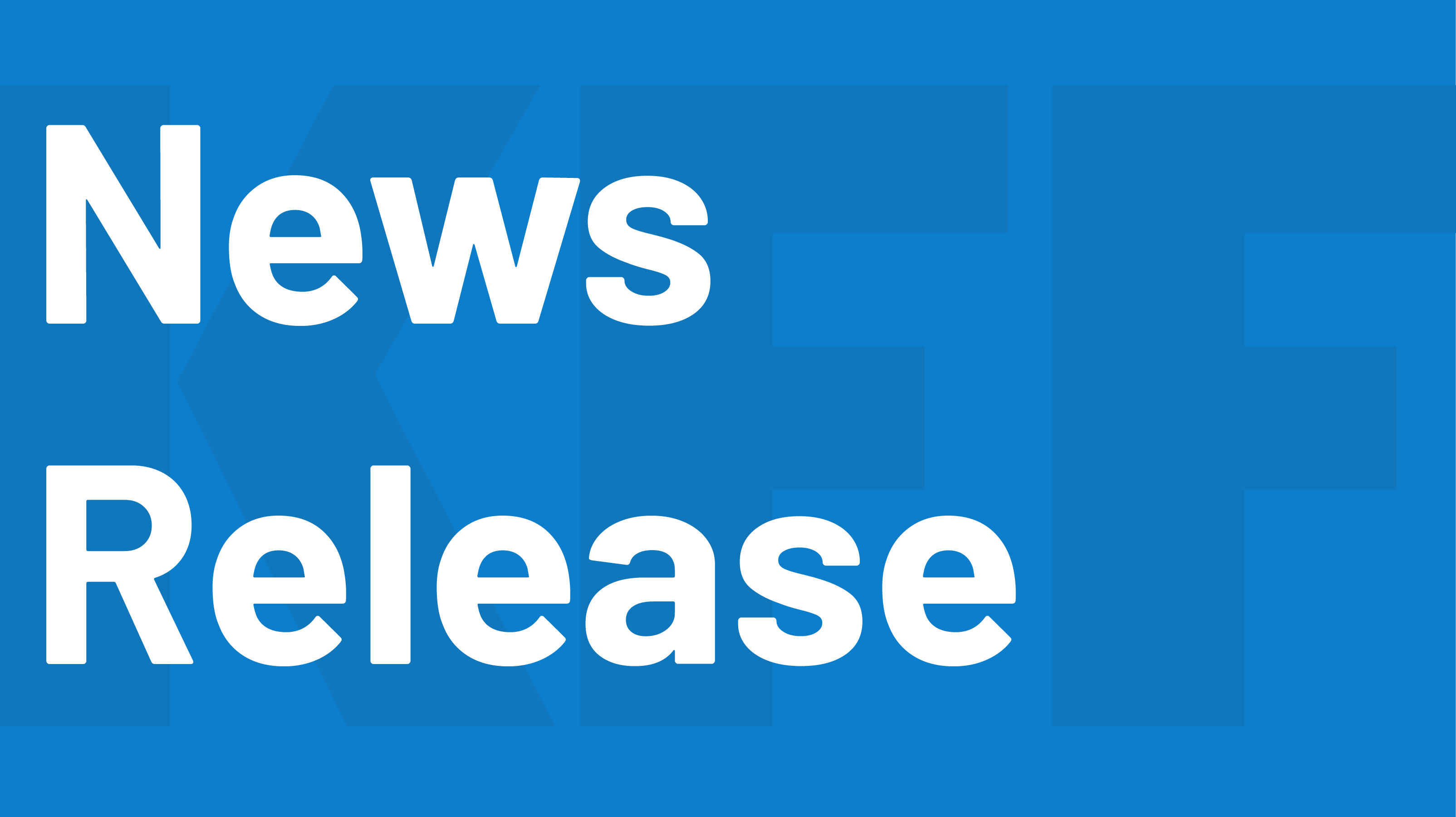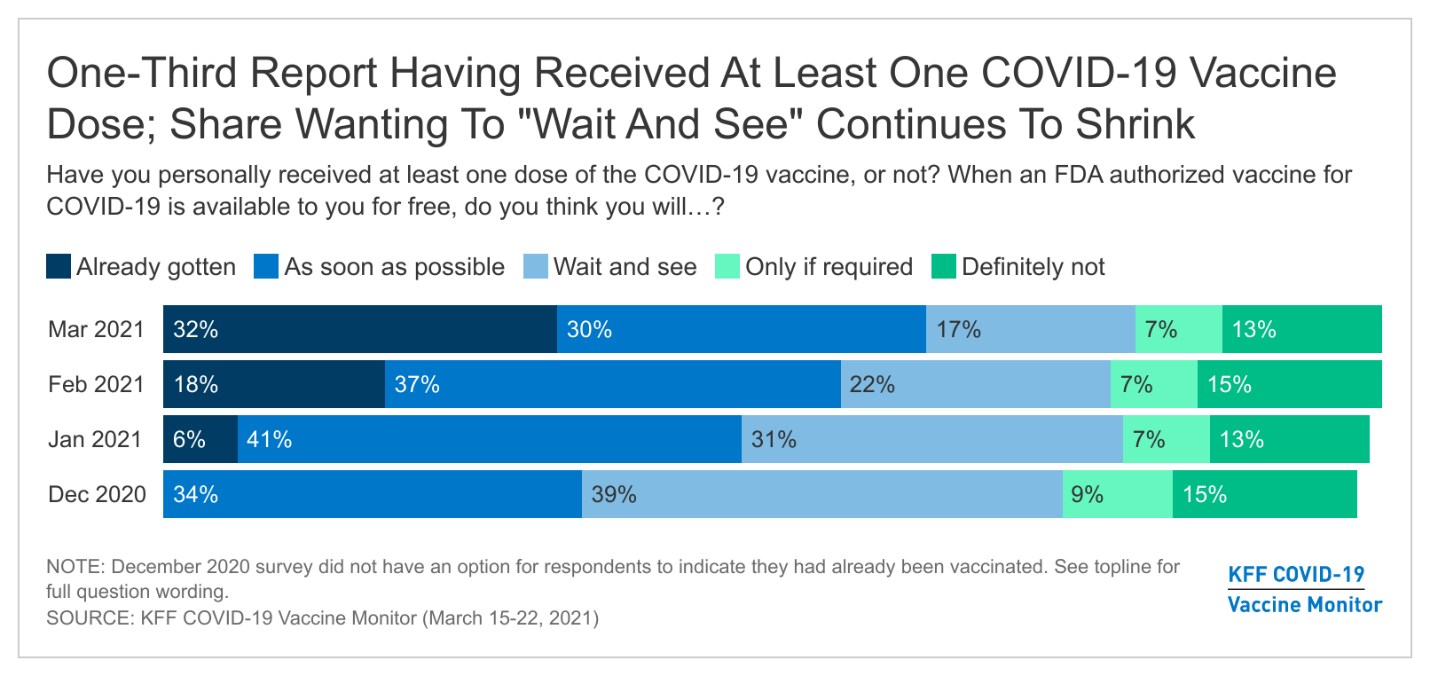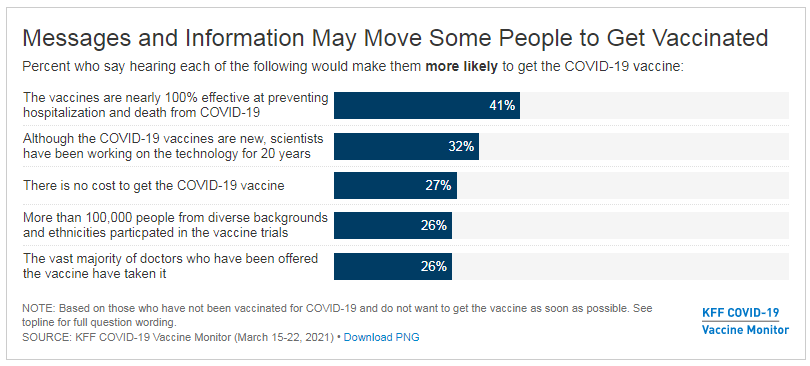The latest KFF COVID-19 Vaccine Monitor report finds enthusiasm for getting a COVID-19 vaccine continuing to grow, with roughly 6 in 10 adults (61%) now saying they have already gotten at least one dose (32%) or want to get vaccinated as soon as they can (30%).
That’s up from a combined 55% in February and 47% in January, as more people report getting vaccinated and fewer say they want to “wait and see” how the vaccine works in others before getting it themselves (17% now, compared to 22% in February and 31% in January).
A quarter (24%) of Black adults continue to want to “wait and see” before getting vaccinated, down from a third (34%) in February, but still somewhat higher than the share of White adults (16%).
About 1 in 5 adults (20%) remain more reluctant about vaccination, either saying they would only do so if required for work, school or other activities (7%), or would definitely not get vaccinated (13%). The groups most likely to say “definitely not” to a vaccine include Republicans (29%) and White Evangelical Christians (28%)
“With more people embracing vaccination and the ‘wait and see’ group shrinking rapidly, outreach efforts increasingly can target people with more deep-seated resistance,” KFF President and CEO Drew Altman said.
Most People Now Say They Know Enough About When and Where They Can Get Vaccinated
For the first time, a majority of those who have not yet been vaccinated say they have enough information both about where (67%) and when (53%) they can get vaccinated, though the report also finds a sizeable minority that lacks key vaccine information.
Overall, 3 in 10 of those who have not been vaccinated say they don’t know if they are currently eligible to get a vaccine in their state. The share that is uncertain is highest among Hispanic adults (45%), those under age 30 (39%), with annual household incomes under $40,000 annually (37%), and those without a college degree (35%).
Among all adults who have not been vaccinated but believe they are eligible, about one-third say they tried to make an appointment to get the COVID-19 vaccine, including roughly equal shares who say they were (16%) and were not (17%) able to successfully schedule an appointment.
“As vaccine supply has increased and more people become eligible to get a shot, more people seem able to navigate the system – though key information gaps remain, particularly for those with low incomes and lower levels of education,” Executive Vice President Mollyann Brodie said.
Information and Employer Incentives Could Encourage More People to Get Vaccinated
This month’s monitor also tests various pieces of information to gauge whether they influence those who aren’t already vaccinated or hoping to get vaccinated as soon as possible. Some of the most effective are hearing that:
- The vaccines are nearly 100% effective at preventing hospitalizations and deaths from COVID-19 (41% say this would make them more likely to get vaccinated).
- Scientists have been working on the technology used in the new COVID-19 vaccines for 20 years (32%).
- There is no cost to get the vaccine (27%).
- More than 100,000 people from diverse backgrounds and ethnicities took part in the vaccine trials (26%).
- The vast majority of doctors who have been offered the vaccine have taken it (26%).
The monitor also probes the potential for employers to promote vaccination through conveniences and financial incentives.
Among people who are employed but are not yet convinced to get a vaccine right away, a quarter (25%) say they would be more likely to do so if their employer arranged for a medical provider to administer the vaccine at work.
Nearly as many (19%) say they would be more likely to get vaccinated if their employer offered an extra $50 if they got vaccinated, and that share rises to 22% for a $200 financial incentive.
The public is almost evenly divided on whether an employer should be allowed to require certain workers to get vaccinated for COVID-19, with half (51%) saying it should and nearly as many (45%) saying it shouldn’t. This split reflects a sharp partisan divide, with most Democrats (70%) saying employer should be allowed to require vaccination, and most Republicans (71%) saying they should not.
Across the board, the information and incentives tested are most effective at persuading the “wait and see” group to get vaccinated, and to a lesser extent, the “only if required” group. Few of those who say they “definitely will not” get the vaccine say any of the incentives or messages would increase their likelihood of getting vaccinated.
Most Who Are Open to Getting Vaccinated Don’t Have a Strong Preference for a Specific Vaccine
There are now three vaccines available in the U.S. About half (46%) of those who are open to getting vaccinated do not have a preference which one they get, while about a quarter (24%) having a slight preference and a bit more (28%) having a strong one.
Among those open to getting vaccinated, similar shares say they would definitely or probably get the one-dose Johnson & Johnson vaccine (69%), and the Pfizer (70%) and Moderna (67%) two-dose vaccines.
The report suggests a one-dose vaccine appeals to a significant segment of the public. Among those who express a preference for one vaccine over another, their top reason was the ease of a one-dose vaccine (24% cited this). Other reasons include their perceptions of the vaccines’ relative effectiveness (14%), hearing good or better things about a particular vaccine vs. others (7%), and being concerned about side effects or a reaction to a particular vaccine.
Designed and analyzed by public opinion researchers at KFF, the KFF Vaccine Monitor survey was conducted from March 15-22 among a nationally representative random digit dial telephone sample of 1,862 adults, including oversamples of adults who are Black (490) or Hispanic (476). Interviews were conducted in English and Spanish by landline (356) and cell phone (1,506). The margin of sampling error is plus or minus 3 percentage points for the full sample. For results based on subgroups, the margin of sampling error may be higher.
The KFF COVID-19 Vaccine Monitor is an ongoing research project tracking the public’s attitudes and experiences with COVID-19 vaccinations. Using a combination of surveys and qualitative research, this project tracks the dynamic nature of public opinion as vaccine development and distribution unfold, including vaccine confidence and hesitancy, trusted messengers and messages, as well as the public’s experiences with vaccination.



